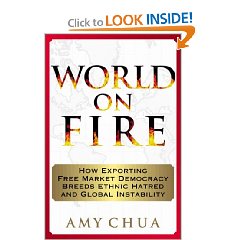 Disappointing, Oversold, Original as far as it goes, January 11, 2008
Disappointing, Oversold, Original as far as it goes, January 11, 2008
Amy Chua
I like the author and gave her first book, World on Fire high marks. I found her treatment of the Chinese diaspora in that book to be quite valuable.
This book is disappointing for a number of reasons, not least of which is the treatment of “America” as a monolyth, a generic “hyperpower,” never mind any of the following:
Vice: Dick Cheney and the Hijacking of the American Presidency
Running On Empty: How The Democratic and Republican Parties Are Bankrupting Our Future and What Americans Can Do About It
The Battle for the Soul of Capitalism
The Cheating Culture: Why More Americans Are Doing Wrong to Get Ahead
I happen to be familiar with China's new strategy, a one-page memorandum can be found by looking for <steele chinese irregular warfare.> The Chinese have neutralized US weapons and mobility systems, and are waging peace on a global scale.
What troubled me about this book was the combination of glorious generalizations with a lack of specifics, for example, China right now has a potentially catastrophic combination of water and energy outages with continuing potential for a pandemic.
The eight challengers the Earth Intelligence Network has identified are Brazil, China, India, Indonesia, Iran, Russia, Venezuela, and Wild Cards like the Congo.
America is on the ropes because we are coming off a quarter century of a two party spoils system that knew all about Peak Oil in 1974, and decided to betray the public trust and ignore the problem. Similarly are water and food security, our public health, all are abyssmal because of a series of venal leaders among whom Dick Cheney stands out for evil, and young Bush for stupid.
I am also troubled because the author, while serving up an interesting overview, does not trouble to review the lessons of history from others, for example, Will and Ariel Durant or John Lewis Gaddis. Morality is a strategic asset of incalculable value. Time is the one asset that cannot be bought nor replaced. Our ignorance of history makes the past a “denied area” of little use to using the present to plan for the future.
On balance this book comes across as a one page outline fleshed out. The Technical Preface by Robert Garigue, RIP, to Information Operations: All Information, All Languages, All the Time is still the best statement published: it's about long-term education of mind of man, with morality, legitimacy, and dignity. Get that right and everything else takes care of itself. Visit Earth Intelligence Network to learn more.
I was also hoping to see more about emerging solutions and the wealth of networks. If we have one thing going for us in America, it is that 66 languages are spoken in Queens, NY, 183 languages across the Nation, and we could, if we wanted to, rapdily recruit 100 million volunteers able to educate the 5 billion poor one cell call at a time, in their own language.
I do not regret buying this book, but in my view, it delivered no more than 50% of its potential while being way too indiscriminate about the details. There is too much missing from this book. See my lists.
See also
The Search for Security: A U.S. Grand Strategy for the Twenty-First Century
High Noon 20 Global Problems, 20 Years to Solve Them
The Wealth of Networks: How Social Production Transforms Markets and Freedom
The Fortune at the Bottom of the Pyramid: Eradicating Poverty Through Profits (Wharton School Publishing Paperbacks)



